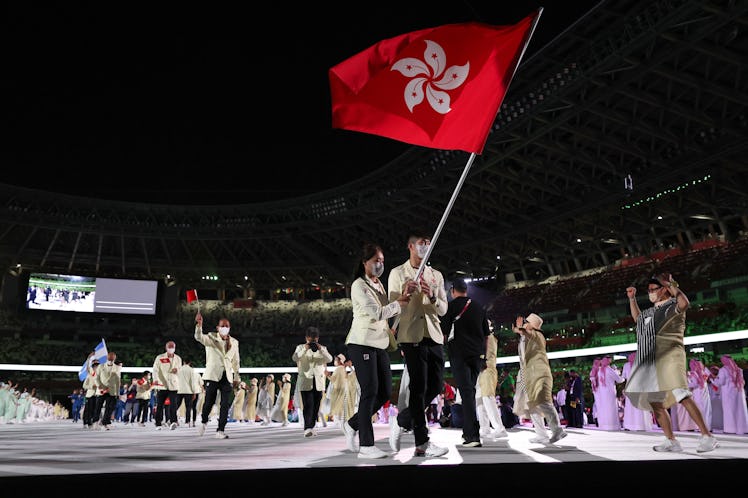
You're Not The Only One Confused About Hong Kong's Team At The Olympics
Unsurprisingly, this is kind of complicated.
After a year of delay due to the ongoing COVID-19 pandemic, the 2020 Tokyo Summer Olympics are finally here, and the opening ceremony on July 23, 2021 was as beautiful as ever. Of course, one of the most important moments during the opening ceremony is, as usual, the traditional Parade of Nations. Members of each country's Olympic team march into the main Olympic stadium, officially marking the beginning of the Games. Seeing just how many nations are represented every year is truly a spectacle, and there are some countries you may not know anything about — including Hong Kong. So, why does Hong Kong have its own Olympic team? Isn't it a part of China?
As of July 30, 2021, Hong Kong has won two Olympic medals in the Tokyo Olympics (one gold in fencing, and one silver in swimming). For some sports fans, it’s once again raised the question of why Hong Kong competes as its own country when it’s technically part of China. The answer is, of course, rooted in shifting political borders, colonization and occupation, and general 21st century politics. The territory that comprises Hong Kong was under Chinese dynastic rule until it was colonized and occupied by the United Kingdom in 1841, and used as a military staging point for the British during the first Opium War — a war largely fought to seize control over China’s trading system. Hong Kong then remained under British control until the breakout of World War II, when imperial Japan occupied the region in 1941. Japan relinquished control of Hong Kong back to the U.K. in 1945, when they surrendered after the United States dropped nuclear bombs on Hiroshima and Nagasaki, decimating the cities almost instantly.
In 1984, China and the U.K. signed a joint agreement on Dec. 19 that would eventually return the territory back to China, starting July 1, 1997. The agreement, called the “Handover of Hong Kong,” effectively ended 156 years of British rule in the former colony. So, Hong Kong officially returned to China in 1997 and became the Hong Kong Special Administrative Region of the People's Republic of China. In the handover agreement, China declared it would treat the territory under a "one country, two systems" policy. What does that mean exactly? Essentially, China agreed to exercise their sovereignty over Hong Kong without disturbing the way of life its people were used to under British rule. In other words, Hong Kong continues to operate under a capitalist government within the People’s Republic of China.
So even though Hong Kong technically is a part of China, the "Basic Law" that the Chinese government agreed to with the U.K. allows the territory to represent themselves as a separate autonomous entity at sporting events (such as the Olympics). It also allows for Hong Kong to have its own currency and legal system. But although it is represented as separate from China and by all accounts looks like it is its own country, it’s still a part of the People’s Republic of China. China still influences Hong Kong’s government, namely by electing a handful of officials to office.
Although Hong Kong has the ability to represent themselves and their own identity as a territory apart from China, the Chinese presence in Hong Kong's way of life has been a cause for worry for the people living there. Anson Chan, a high official in the Hong Kong government, told the New York Times in 2017, "More and more, there is a sense of futility. We have this enormous giant [China] at our doorstep, and the rest of the world does not seem to question whatever the enormous giant does." Since 2019, pro-democracy protesters in Hong Kong have staged high profile public demonstrations in opposition to Chinese control, saying that China has backtracked on its promises of autonomy and overridden due process rights, per Human Rights Watch. According to The New York Times, more than 10,000 people have been arrested between June 2019 and July 2021.
So despite the fact that Hong Kong gets their own delegation at the Tokyo Summer Olympics and enjoys some form of autonomy, it still doesn’t exactly have full control of its own government. But at least the Olympics are a chance for Hong Kong to show the world that their people are, in fact, their own entity.
This article was originally published on